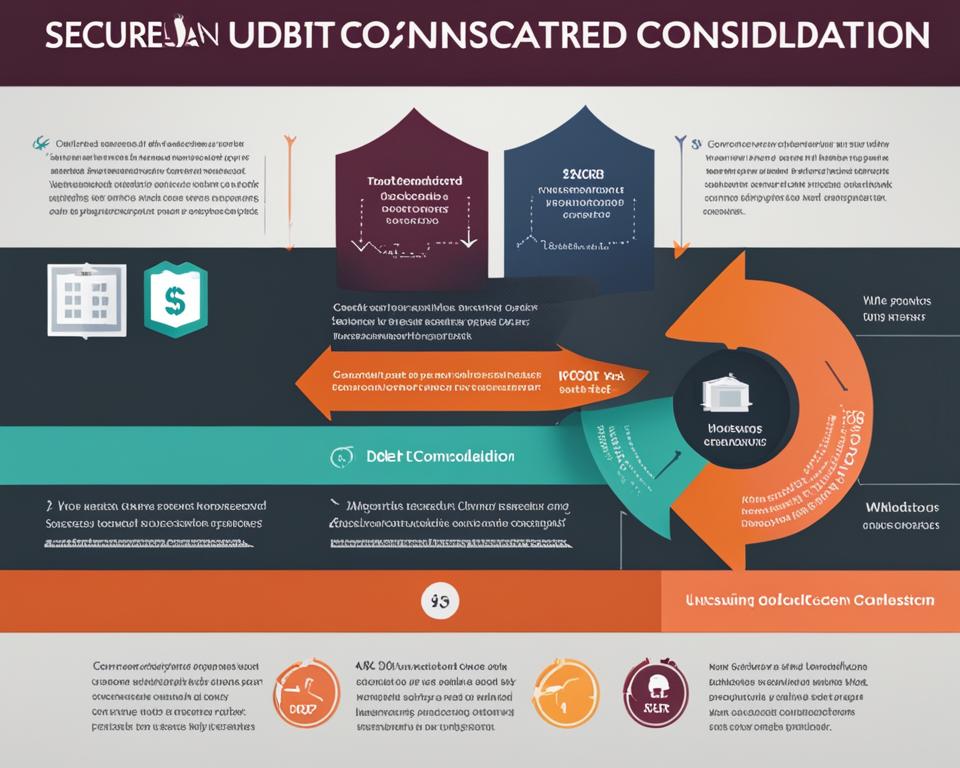Facing multiple debts can often feel overwhelming as individuals in the United States search for solutions to streamline their finances. As they explore various debt consolidation options, the idea of managing varied debts through consolidation becomes an attractive avenue. Debt consolidation loans, provided by financial institutions, offer a single loan to cover the entirety of outstanding debts, thus simplifying the payment process and possibly improving financial stability.
Key Takeaways
- Debt consolidation loans can simplify multiple debt repayments into one single loan.
- Options available include both secured and unsecured forms to suit different financial situations.
- Consolidation can lead to potential interest savings and a shortened repayment time frame.
- Key to consolidation is securing a loan with a lower interest rate than current debts.
- Important to manage the new consolidated debt responsibly to reap long-term benefits.
Understanding Debt Consolidation as a Financial Strategy
When faced with varied financial obligations, individuals often seek out strategies to alleviate the pressure and complexity associated with debt management. One increasingly popular method is debt consolidation, a financial strategy that involves merging several loans or credit balances into one. This approach not only streamlines the repayment process but also holds the potential for more favorable financial terms.
The benefits of consolidating secured and unsecured debts are numerous. Secured debts, backed by collateral, typically come with lower interest rates due to reduced lending risk. Unsecured debts, while not backed by physical assets, can sometimes carry significantly higher interest rates. By blending these types of debts into a single, consolidated loan, borrowers may enjoy the simplicity of a singular payment complemented by the chance of reduced interest costs over time.
One of the principal advantages of this method is the potential for a lower overall interest rate, compared to the combined rates of the individual debts. By securing a consolidated loan with a rate lower than the average of one’s existing debts, an individual can save money that would otherwise be spent on interest, potentially shortening the repayment timeline and easing the path toward financial freedom.
Mixed debt consolidation solutions offer a tailored approach to financial management, accommodating various types of debts into a harmonious repayment plan, and helping individuals take control of their financial futures.
The success of a debt consolidation strategy, however, leans heavily on disciplined financial behavior. It requires the borrower to manage the consolidated debt responsibly, ensuring that payments are made on time and avoiding the accrual of additional debt during the repayment period.
As debt consolidation gains traction among those looking to optimize their financial strategies, it’s critical to understand the mechanics behind it and the full spectrum of its benefits. Aimed at simplification and cost-efficiency, debt consolidation can be a powerful tool in an individual’s financial toolkit, particularly when it combines both secured and unsecured loans into a more manageable and cost-effective loan structure.
- Simplified payment process
- Lower overall interest rate
- Less stress managing multiple accounts
- Quicker debt repayment potential
In essence, for those looking to enhance their financial well-being and steer a clear course toward debt reduction, considering the benefits of consolidating secured and unsecured debts through mixed debt consolidation solutions may provide an invaluable opportunity. It is a decision that holds the key to a more streamlined financial experience and paves the way for sustainable economic health.
Secured vs Unsecured Debt: The Basic Differences
When considering debt consolidation, understanding the fundamental distinctions between secured and unsecured debt is crucial. This knowledge not only aids in combining secured and unsecured debts effectively but also equips borrowers with the insight to make informed choices.
What Qualifies as Secured Debt?
Secured debts are tightly associated with tangible assets. Lenders require an item of value, such as a house or a car, to serve as collateral. This security pledge substantially reduces the lender’s risk. Consequently, these loans often come with more favorable interest rates for the borrower, since the lender has the recourse to seize the asset in the event of default.
Characteristics of Unsecured Debt
Conversely, unsecured debt stands on the opposite end of the spectrum. With no requirement for collateral, these loans are granted based on the lender’s trust in the borrower’s creditworthiness. This trust is typically gauged by credit scores, income levels, and financial history. Higher interest rates on unsecured loans compensate for the heightened risk lenders take in providing these funds without a safety net.
| Loan Type | Collateral Required | Typical Interest Rates | Risks for Borrower | Lender’s Risk |
|---|---|---|---|---|
| Secured Debt | Yes (e.g., house, car) | Lower | Asset seizure on default | Lower (asset-backed) |
| Unsecured Debt | No | Higher | Credit score damage on default | Higher (no collateral) |
Whether it involves secured vs unsecured debt consolidation, understanding these differences can pave the way for strategic financial decision-making. Each consolidation approach has implications on interest rates, risk levels, and credit score impacts. Thoughtfully combining secured and unsecured debts can streamline repayments and potentially alleviate financial stress for borrowers.
Can I consolidate both secured and unsecured debts?
When confronting various types of debt, many borrowers ask, “Can I consolidate both secured and unsecured debts?” The straightforward answer is yes, it is possible to bring together both kinds of obligations into a singular repayment plan. Secured debts, such as a mortgage or car loan, are backed by collateral, whereas unsecured debts like credit cards or medical bills are not. Consolidation can pave the way for a more manageable financial landscape, but it’s crucial to consider the nature of the debts and the terms of any new consolidation loan carefully.
| Debt Type | Features | Consolidation Impact |
|---|---|---|
| Secured Debt | Lower interest rates, Backed by collateral | Possible loss of asset if consolidated into unsecured loan |
| Unsecured Debt | Higher interest rates, No collateral | Interest reduction if consolidated into secured loan |
| Consolidation Loan | May be secured or unsecured, Fixed repayment term | Simplified single payment, Potential for overall lower interest rate |
It’s essential for borrowers to scrutinize the terms of a new consolidation loan to ensure that it offers a beneficial comparison to their current debts. When secured and unsecured debts are combined effectively, the result can be a streamlined repayment process and, potentially, a reduction in total interest paid over time.
Key Considerations:
- Review interest rates and compare them against the new loan terms.
- Evaluate the risks associated with transferring unsecured debts into secured loans.
- Consider the impact on your credit score based on the restructuring of debt.
Before proceeding, one might consult with a financial advisor to carefully assess the risks and rewards of consolidating both secured and unsecured debts. This decision should align with the borrower’s long-term financial stability and goals.
The Process of Consolidating Multiple Debts
For individuals juggling various financial obligations, managing varied debts through consolidation presents a structured path to regain control of their finances. Simplifying the repayment strategy not only streamlines the monthly bill-paying process but can also offer a mental reprieve from the stress associated with debt management. With debt consolidation for different types of debts, borrowers can potentially lock in lower interest rates and pave the way towards a debt-free future.
To understand how this strategy plays out in practical terms, let’s delve into the mechanics of debt consolidation loans and the steps involved in consolidating debts effectively.
How Debt Consolidation Loans Work
At its core, a debt consolidation loan works by combining multiple debts into a single, manageable loan. This consolidated loan typically comes with a fixed interest rate, which is ideally lower than the weighted average of the rates on the existing debts. The result is one predictable monthly payment, often aiding the borrower in saving on total interest costs over time and reducing the hassle associated with managing multiple bills.
Steps to Consolidate Your Debts
Embarking on the consolidation journey starts with a few critical steps:
- Evaluate current debts: Take stock of all outstanding debts, noting their balances, interest rates, and monthly payments.
- Choose a suitable lender: Research and compare lenders to find the best terms for a consolidation loan. This may include traditional banks, credit unions, or online lenders.
- Apply for a loan: Once a lender is selected, complete their application process including providing any necessary financial documentation.
- Use the loan to pay off debts: If approved, the loan proceeds are used to pay off existing debts, leaving the borrower with only the consolidation loan to repay.
Throughout each step, the borrower must remain vigilant to secure terms that are favorable and reflect a strategy towards financial improvement.

Whether tackling credit card balances, medical bills, personal loans, or other forms of debt, consolidation can serve as a lifeline. By opting for a well-structured debt consolidation loan, borrowers may find themselves managing their financial landscape more confidently, efficiently navigating their way to a debt-free horizon.
Secured Debt Consolidation Loans Explained
When it comes to managing personal finance, individuals often seek out secured debt consolidation strategies as a means to streamline multiple debt payments while working towards financial stability. A secured debt consolidation loan allows you to combine various debts into one, using collateral like a home or a car to secure the new loan.
These types of loans are typically more attractive due to their lower interest rates compared to unsecured loans. This makes them a wise choice for individuals aiming to reduce their monthly payments and the amount of interest paid over time. Nonetheless, it’s crucial to acknowledge the risk that comes with secured loans—the potential loss of the asset used as collateral if repayments are not consistently made.
Assessing your options for secured debt consolidation should involve careful consideration of your assets, credit history, and repayment capacity. Lower interest rates may indeed make loan repayment more manageable, but they come with the caveat of putting valuable assets on the line.
Here’s an illustration of how secured loans can potentially lower monthly repayments:
| Type of Debt | Interest Rate | Monthly Payment | With Secured Consolidation |
|---|---|---|---|
| Credit Card Debt | 20% | $250 | $350* |
| Auto Loan | 7% | $150 | |
| Personal Loan | 10% | $100 |
*Note: The combined monthly payment after consolidation is lower, spreading out the payments over a possibly longer term with a consolidated, lower interest rate.
By merging multiple debt sources into one secured loan, borrowers can redefine their debt repayment plans, moving forward with a renewed focus on their financial objectives. However, while this strategy has the ability to streamline debt management, it is also paired with the significant responsibility of protecting the assets held against the loan.
Exploring Your Secured Debt Consolidation Options
Choosing the right secured debt consolidation strategy is a significant financial decision that can affect your financial stability and peace of mind. Understanding the various options available to you, including the various home lending products, is crucial in making an informed choice that aligns with your needs and financial goals.
Secured Personal Loans
Secured personal loans are a cornerstone among secured debt consolidation strategies. By leveraging assets such as vehicles or savings accounts as collateral, borrowers access potentially lower interest rates than their unsecured counterparts. The lower risk to lenders translates to more favorable terms for borrowers, ensuring a structured path to paying off existing debts.
Home Equity Loans and HELOCs
For homeowners, home equity serves as a powerful tool in the realm of debt consolidation. Home equity loans offer a lump sum, allowing for immediate debt repayment plans with predictable, fixed repayment schedules. On the other hand, Home Equity Lines of Credit (HELOCs) provide flexibility, functioning like a credit card against your home’s value with revolving access to funds. Both options are integral home lending products in the secured loan landscape.
Using your home as collateral comes with inherent risks, but with disciplined financial management, a home equity loan or HELOC can be instrumental in achieving debt-free status.
Assessing your eligibility for a secured loan involves a close examination of your collateral’s value and ensuring you can meet the repayment terms, which is essential in avoiding potential risks such as property loss. Choosing between a secured personal loan or a home equity-based product depends on one’s comfort with leveraging a home and the desired flexibility in repayment.
Ultimately, your individual financial circumstances and long-term goals will govern the most suitable secured debt consolidation strategies for your situation.
Using an Unsecured Loan for Debt Consolidation
When managing multiple debts becomes overwhelming, an unsecured loan for debt consolidation can be a viable option to streamline finances. Unlike secured loans, these do not necessitate putting up assets as collateral. This presents an attractive route for individuals seeking debt relief without the risk of losing personal property.
Unsecured Personal Loans
Unsecured personal loans are often used for consolidating debt as they may provide a significant amount of funds that can be used to clear various outstanding balances. Financial institutions offer these loans based primarily on an individual’s credit history and income level, thus making them a solution for borrowers with strong credit profiles. Though they may have higher interest rates compared to secured loans, the fixed rates and terms offer predictability in budgeting.
Peer-to-peer Lending for Debt Relief
On the cutting edge of financial services, peer-to-peer lending stands out as an innovative debt consolidation option. This method involves obtaining funds directly from investors through online platforms, circumventing conventional banking systems. While the approval process can be more lenient and the funding times quicker, it’s important to note that the costs can be higher, making diligent research indispensable.
To illustrate the distinct features of traditional personal loans and peer-to-peer lending mechanisms, consider the following comparative table:
| Feature | Unsecured Personal Loans | Peer-to-peer Lending |
|---|---|---|
| Collateral Required | No | No |
| Interest Rates | Fixed, may be higher than secured loans | Varies, potentially higher due to investor-driven rates |
| Funding Speed | Variable, depending on lender | Often quicker, due to streamlined online platforms |
| Credit Score Impact | Approval based on creditworthiness | May offer more flexibility for those with lower scores |
| Repayment Terms | Fixed terms offer clear payoff date | Fixed or flexible, dictated by terms agreed with individual lenders |
The choice between an unsecured loan for debt consolidation and peer-to-peer lending depends on personal financial circumstances, risk tolerance, and the need for flexibility or security in repayment structure. In each case, the borrower benefits from the simplicity of a single monthly payment, potentially aiding in the effective management of debt obligations.
Comparing Rates: Secured vs Unsecured Loans
When embarking on the journey of debt consolidation, it’s vital to comprehend the financial landscape, specifically when comparing secured and unsecured loans. The critical difference between these loan types lies in the collateral requirements and consequent interest rates on loans. Secured loans are backed by assets which often lead to preferential interest rates given the reduced risk to lenders. Alternatively, unsecured loans are granted based predominantly on an individual’s creditworthiness, incurring higher rates due to the absence of collateral.
For those evaluating debt consolidation, the nuances of each loan type’s interest rates can influence long-term payment plans. The following table provides insight into a generalized comparison of average rates one might expect:

| Loan Type | Typical Interest Rate Range | Pros | Cons |
|---|---|---|---|
| Secured Loan | 3% – 10% | Lower interest rates, higher borrowing limits, longer repayment terms | Risk of asset forfeiture, potential for longer debt obligation |
| Unsecured Loan | 6% – 36% | No collateral required, quicker application process, suitable for smaller loans | Higher interest rates, generally lower borrowing limits, stricter credit score requirements |
While comparing secured and unsecured loans, it’s crucial to consider personal financial goals and circumstances. A secured loan might be more attractive for those who possess substantial assets and seek lower interest rates. Conversely, an unsecured loan could be preferable for individuals aiming to avoid the risk of collateral seizure, despite potentially higher rates.
How Consolidating Affects Your Credit Score
Exploring the impact of debt consolidation on credit score involves examining the nuances of credit reporting and how financial decisions influence this vital indicator of credit health. Recognizing the immediate and sustained shifts in one’s credit score as a result of consolidating various debts is crucial for anyone considering this financial maneuver.
The Immediate Impact
Initially, the act of applying for a debt consolidation loan may trigger a slight dip in your credit score. This effect stems from the hard inquiry lenders perform to evaluate creditworthiness. Although this is a temporary setback, it’s a necessary step in the process, one that can lead to beneficial outcomes in the management and repayment of debt.
Long-Term Credit Score Benefits
Over the longer term, a well-managed debt consolidation strategy can foster significant credit score benefits. Consistent, timely payments on a consolidated loan contribute positively to a person’s payment history, which is a major factor in credit scoring algorithms. Furthermore, by consolidating multiple debts into one, borrowers may also lower their credit utilization ratio, a move that can positively affect credit scores over time. It is this diligent maintenance of credit, alongside a more streamlined and manageable debt profile, that supports a healthy and upward trending credit score.
Best Practices for Managing Consolidated Debt
When it comes to controlling your finances after consolidating debt, it’s essential to follow a set of best practices for debt management. These guiding principles are designed to keep you on a sustainable path toward financial stability, centered around creating a budget and avoiding the temptation to take on new debt. By applying these tried and true strategies, you’ll be better equipped to manage your consolidated debt effectively.
Creating a Sustainable Budget
The cornerstone of managing consolidated debt is to create a budget that realistically reflects your income and expenses, including your new loan payments. By detailing your monthly cash flow, you ensure that repayment remains a top priority, and expenses do not outweigh your income. This budget should be revisited and adjusted as needed to remain up-to-date and effective. For visual clarity, let’s break down a sample monthly budget:
| Income | Expenses | Debt Repayment | Savings |
|---|---|---|---|
| $3,500 | $2,000 | $700 | $800 |
| Monthly Pay | Rent/Mortgage | Consolidated Loan Payment | Emergency Fund |
| Utilities | Retirement Fund | ||
| Groceries | Investments | ||
| Transportation |
Avoiding New Debt
As important as creating a budget is avoiding new debt, which can derail the progress you’ve made through consolidation. Implementing strategies such as cutting unnecessary expenses, using cash instead of credit, and building an emergency fund are key to staying away from fresh financial obligations. However, life is unpredictable, and sometimes new debt is inevitable; in those cases, prioritize paying it off swiftly to avoid complicating your debt management plan.
Adhering to these practices not only helps to manage current consolidated debt but also lays a foundation for a healthier financial future. By incorporating these strategies into your daily life, you empower yourself to maintain control over your finances and cultivate a sense of security and peace of mind.
Understanding the Risks of Debt Consolidation
Debt consolidation can be a tempting option for those seeking to streamline their finances, but it’s essential to be aware of the potential disadvantages involved. A key consideration is the risks of debt consolidation, which can have long-term implications for one’s financial health.
One of the noteworthy risks includes endangering valuable assets when securing loans against collateral. This can lead to scenarios where borrowers might lose their homes or cars if they default on their consolidated loan payments. Additionally, while consolidating debts may lower monthly payments, it’s possible to incur additional fees such as balance transfer fees, closing costs, or even penalties for early payments on existing loans.
Equally important is understanding how debt consolidation might influence financial behavior. Without addressing the root causes that led to debt accumulation, such as spending habits, there is a risk of falling into a cycle of indebtedness. This makes it crucial to consider not just the immediate relief that consolidation might provide, but also whether it supports a sustainable path to financial stability.
| Potential Risk | Description | Considerations |
|---|---|---|
| Loss of Collateral | If unable to meet payment obligations, assets used as collateral might be forfeited. | Is the risk of losing an asset worth the consolidation? |
| Additional Fees | Upfront fees for loan processing, balance transfers, and other associated costs could diminish savings. | Calculate all related costs to ensure true savings. |
| Recurrence of Debt | Consolidation alone does not correct financial habits, which might lead to recurring debt. | Plan to address spending behavior and budget management. |
It’s pivotal for anyone considering debt consolidation to weigh these factors against the potential benefits. By conducting thorough research and possibly consulting with a financial advisor, one can ensure an informed opinion is formed before opting for this financial strategy.
Are You Eligible for Debt Consolidation?
Exploring the potential to streamline your finances through debt consolidation begins with a careful financial assessment. This critical step is when you gauge your readiness and map out a plan to meet lender requirements. With an understanding of eligibility for debt consolidation, you’re better positioned to take informed steps towards a more stable financial future.
Assessing Your Financial Situation
To embark on debt consolidation, start with a holistic review of your finances. Key factors including your credit score, stable income, and your debt-to-income ratio must be thoroughly evaluated. These elements not only influence your eligibility but also the terms you may be offered. Gathering this information provides a foundational understanding of your financial health and sets the stage for a successful consolidation process.
Lender’s Criteria for Debt Consolidation
Each lender’s requirements for consolidation loans can vary. Nonetheless, certain core criteria prevail across the industry. Lenders scrutinize your creditworthiness, which encompasses credit history and scores. Additionally, for secured loans, the value of your assets available as collateral is critical. Meeting these qualifications is indispensable for loan approval, and ultimately, for achieving the financial ease that debt consolidation can offer.

An essential factor that lenders consider is your commitment to maintaining strong financial practices post-consolidation. Therefore, it’s beneficial not only to meet the bare minimum for eligibility but to present yourself as a responsible borrower by managing your finances prudently.
Impact of Credit History on Debt Consolidation
When navigating the complexities of debt consolidation, the influence of one’s credit history is undeniable. This particular facet of financial history is a cornerstone in determining the outcome of loan applications and the subsequent terms that dictate financial commitments. Therefore, understanding and cultivating a robust credit history is critical for those seeking not only approval but also improved conditions on debt consolidation loans.
Creditworthiness and Loan Approval
A prospective lender’s assessment of creditworthiness hinges on past credit behavior, encapsulating payment punctuality, credit utilization, and the diversity of credit accounts. A proven track record of financial reliability can be the deciding factor in not just obtaining loan approval, but securing it under favorable conditions. Conversely, a spotted credit history may present obstacles, leading to higher interest rates or outright denial.
Improving Your Chances for Better Loan Terms
Boosting one’s creditworthiness is a strategic endeavor that demands attention and persistent effort. Actions such as rectifying inconsistencies in credit reports, paying down existing debt to lower credit utilization ratios, and ensuring the timely payment of bills can significantly enhance credit scores. By methodically nurturing one’s credit profile, individuals position themselves to unlock better loan terms with lower interest rates and more manageable repayment timelines.
Secured and Unsecured Debt Consolidation Strategies
When determining the most advantageous path in financial decision-making, understanding the divergences between secured and unsecured debt consolidation strategies becomes crucial. The choice between these options should align with personal financial circumstances and long-term objectives.
Secured debt consolidation is often sought after for its lower interest rates, which are attributable to the assurance that collateral provides to lenders. Common forms include home equity loans or vehicle-backed loans. Nonetheless, the imperative consideration here is the potential forfeiture of the borrower’s asset should they fail to uphold payment obligations.
On the flip side, unsecured debt consolidation strategies, while typically commanding higher interest rates, offer a layer of security for personal property. These loans are primarily based on a borrower’s creditworthiness, refraining from binding personal assets as loan security.
| Strategy | Interest Rates | Risk to Assets | Dependence on Credit Score |
|---|---|---|---|
| Secured Debt Consolidation | Lower | High | Moderate |
| Unsecured Debt Consolidation | Higher | None | High |
Choosing between these strategies requires a profound contemplation of risk tolerance, asset availability, and financial goals. It’s sensible for borrowers to ask themselves whether the lower rates afforded by secured loans are worth the gamble of potentially sacrificing personal assets, or if the safety of unsecured loans justifies the extra cost in interest.
Ultimately, this key financial decision will lay down a foundation for debt management that influences the borrower’s economic future. Therefore, thorough comparison and careful analysis are pivotal steps on this journey.
Seeking Professional Advice for Debt Consolidation
When the tangle of multiple debts becomes overwhelming, it is wise to consider the proven benefits of debt consolidation. However, navigating the myriad of options and determining the best course of action can require expertise beyond the average consumer’s knowledge. That’s where professional advice for debt consolidation comes into play, providing individuals with the debt management expert guidance they need to make educated financial decisions.
The Importance of Expert Guidance
Debt consolidation experts are equipped with an intricate understanding of financial products, market trends, and regulatory nuances, which can be instrumental in crafting a personalized debt management plan. Their unbiased advice ensures individuals receive clear and actionable insights that align with their unique financial circumstances. From finding the most suitable consolidation loans to discussing the potential impact on credit scores, these professionals pave the way for informed decision-making.
Navigating Complex Consolidation Scenarios
Each debt situation is unique, and some can be particularly labyrinthine with a mix of secured and unsecured loans, variable interest rates, and stringent creditor terms. In such situations, debt management expert guidance can demystify complex scenarios and help debtors to understand the full implications of their choices. Working collaboratively, experts can assist in exploring various debt consolidation strategies, ensuring that clients are equipped with the knowledge to move forward confidently and responsibly.
| Consideration | Without Expert Advice | With Expert Guidance |
|---|---|---|
| Understanding of Options | Limited by personal research and knowledge | Expanded with professional insights |
| Risk Assessment | Potential oversight of critical risk factors | Comprehensive evaluation of risks and benefits |
| Long-Term Impact | Focused on immediate relief, potentially neglecting future repercussions | Balanced approach considering both immediate and future financial health |
| Financial Plan Customization | Generic solution that may not align with individual needs | Tailored strategies to fit personal financial situations |
| Support and Education | Self-directed learning and decision-making | Ongoing support and education on debt management |
Conclusion
Embarking on the road towards financial stability often requires strategic maneuvers, one of which is the judicious consolidation of debts. For many, combining secured and unsecured debts can significantly enhance their financial journey, providing a clearer path toward fiscal responsibility. This method can streamline monthly payments and potentially decrease the cost of borrowed money. However, executing debt consolidation decisions must be approached with meticulous planning and a deep understanding of the inherent advantages and potential pitfalls.
Secured and unsecured debt consolidation efforts bring with them specific considerations that warrant a thorough assessment. Individuals must scrutinize interest rates, repayment terms, and any underlying risks associated with collateral assets. It is prudent to delve into these choices armed with comprehensive research and a detailed financial analysis, ensuring that any steps taken are conducive to achieving personal financial aspirations.
As individuals confront their financial realities and contemplate debt consolidation as a viable strategy, seeking the expertise of a financial advisor could be invaluable. With professional guidance, the intricate decisions associated with consolidating debts can be navigated more effectively, ensuring that each action is a strategic fit within the broader scope of one’s financial journey. In essence, careful planning and expert advice are paramount in paving the way to a more stable and prosperous financial future.
FAQ
What are the main benefits of consolidating secured and unsecured debts?
The main benefits include a streamlined payment process, potential savings on interest, and possibly a quicker path to becoming debt-free.
Can I consolidate both secured and unsecured debts?
Yes, it is possible to consolidate both types of debts, although it involves careful consideration of the consolidation method and the terms of the new loan.
What qualifies as secured debt?
Secured debt is a loan that is backed by collateral, such as a mortgage secured by a home or a car loan backed by a vehicle.
What are the characteristics of unsecured debt?
Unsecured debt does not require collateral and is extended based on the borrower’s creditworthiness, often resulting in higher interest rates compared to secured debt.
How do debt consolidation loans work?
Debt consolidation loans combine multiple debt accounts into a single loan with a potentially lower interest rate and a fixed repayment term, simplifying debt management.
What are the typical steps to consolidate your debts?
Steps include evaluating your current debts, selecting an appropriate lender, and using the loan proceeds to pay off your various existing higher-rate debts.
What are some secured debt consolidation strategies?
Strategies include secured personal loans using collateral like a home or vehicle to obtain better interest rates, or utilizing home equity loans and HELOCs.
How can I use an unsecured loan for debt consolidation?
You can apply for an unsecured personal loan or engage in peer-to-peer lending to pay off existing debts without the need for collateral.
Should I choose a secured or unsecured loan for debt consolidation based on interest rates?
It depends on your financial situation and collateral. Secured loans typically offer lower rates due to less risk for the lender, but unsecured loans may be suitable if you don’t have assets or prefer not to risk them.
How will consolidating my debts affect my credit score immediately and in the long term?
Consolidating debts can lead to a slight decrease in your credit score due to a hard inquiry. Over time, however, making consistent on-time payments can improve your credit history and potentially increase your score.
What are the best practices for managing consolidated debt?
It’s important to establish a budget that accounts for the new loan repayment, keep up with living expenses, and avoid accumulating new debt.
What risks should I be aware of when considering debt consolidation?
Risks include the potential loss of collateral on a secured loan, incurring additional fees, and not addressing spending habits that led to the debt.
How do I know if I am eligible for debt consolidation?
Eligibility depends on your credit score, income, debt-to-income ratio, available collateral, and the lender’s specific requirements.
How does my credit history impact debt consolidation?
A good credit history can lead to lower interest rates and better loan terms, while a poor history may result in higher rates or loan denial. Improving creditworthiness prior to applying is beneficial.
Should I opt for a secured or unsecured debt consolidation strategy?
The choice depends on your financial situation, assets, credit history, and willingness to risk collateral. Both strategies have pros and cons aligned with individual financial goals.
Why is seeking professional advice for debt consolidation important?
Professional advice is valuable to ensure you understand all your options and make informed decisions, especially when facing complex financial situations.
How can expert guidance help when navigating complex consolidation scenarios?
Financial professionals can provide unbiased information, help tailor strategies to individual needs, and assist in making the best possible debt consolidation decisions.





